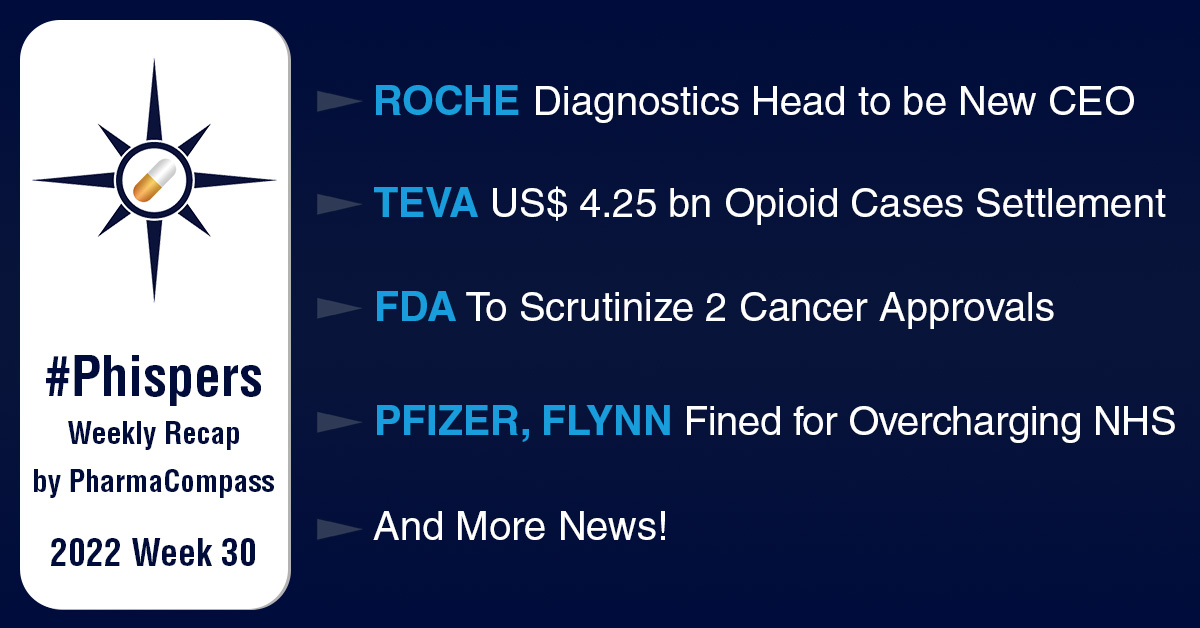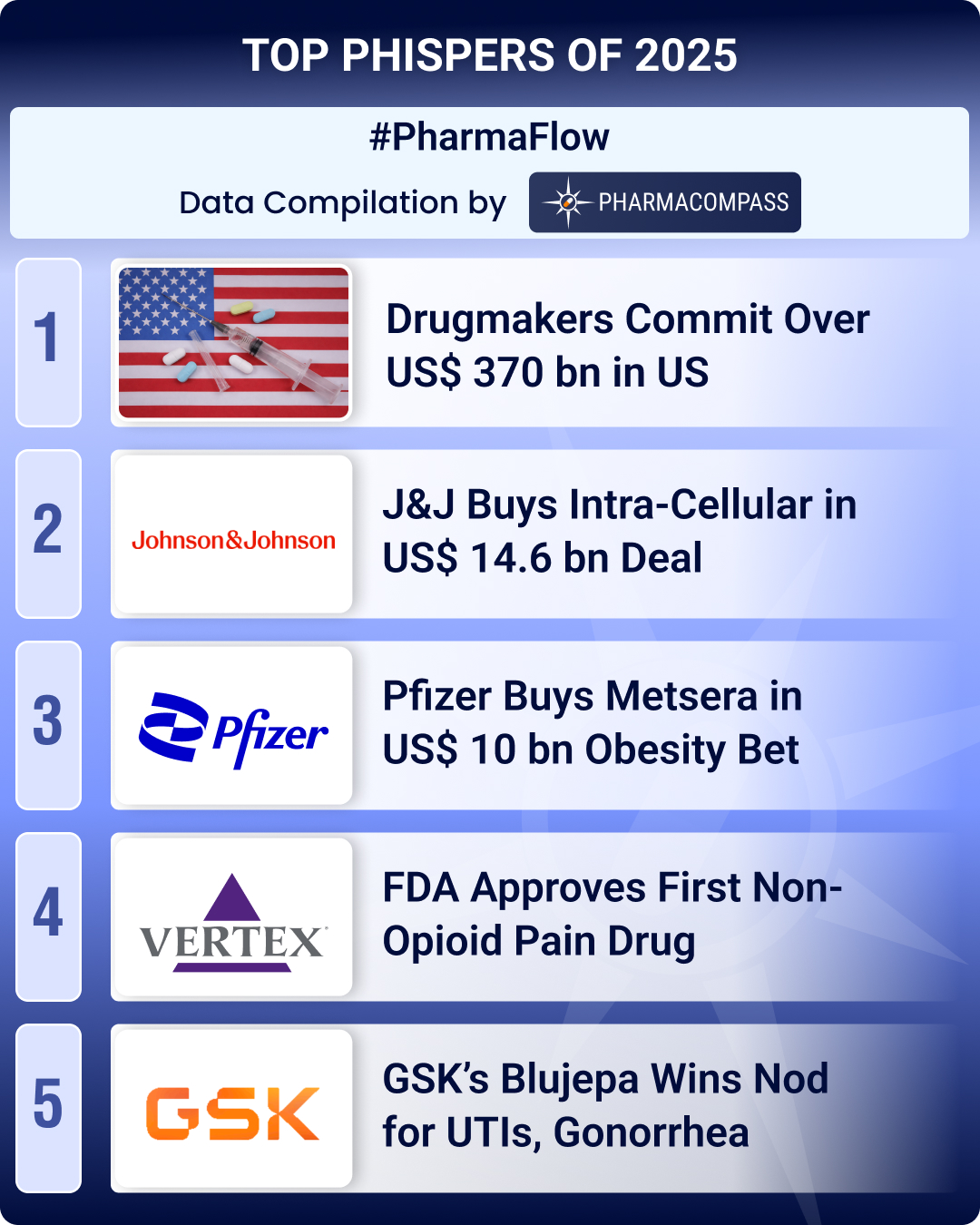
By PharmaCompass
2022-07-28
Impressions: 1,343 Article
This week, Teva announced a US$ 4.25 billion proposed national settlement agreement to resolve thousands of lawsuits over its alleged role in the US opioid crisis. Similarly, AbbVie’s Allergan unit reached an agreement to pay over US$ 2 billion to resolve over 3,000 opioid-related lawsuits filed by state and local governments in the US.
Roche’s head of diagnostics, Thomas Schinecker, will take over as the CEO of the Swiss Pharma in March next year. Schinecker will replace long-serving CEO Severin Schwan, who will take up the chairman’s role.
Bavarian Nordic’s monkeypox vaccine has received marketing authorization in Europe. The company’s facility in Denmark has received FDA’s go-ahead to manufacture the vaccine in order to meet increased demand.
AstraZeneca has nabbed EU recommendations for two of its drugs – Tezspire to treat severe asthma and Ultomiris for the treatment of generalized myasthenia gravis, a rare muscle-wasting disease. Astra’s Enhertu has also received a strategic priority review as treatment for HER2-low metastatic breast cancer. Meanwhile, Biogen has secured a priority review status from the US Food and Drug Administration (FDA) for tofersen, a therapy for a rare type of amyotrophic lateral sclerosis (ALS).
The European Medicines Agency (EMA) has recommended restricting the use of Clovis Oncology’s cancer medicine Rubraca, after data from a clinical trial showed the drug was not as effective as chemotherapy at prolonging lives of patients. Meanwhile, the FDA’s Oncologic Drugs Advisory Committee will meet in September to discuss the fate of two drugs – Oncopeptides’ Pepaxto and Secura Bio’s Copiktra – which have already won accelerated approvals, but have either failed to live up to early expectations or have raised safety concerns.
Antitrust authorities in the UK have imposed a fine of £70 million (US$ 83.6 million) on Pfizer and Flynn Pharma for overcharging the National Health Services (NHS) for a life-saving epilepsy drug.
And in M&A news, Shanghai-based Rona Therapeutics has acquired worldwide exclusive rights to Sanofi’s small interfering RNA (siRNA) platform along with four preclinical candidates.
Teva to pay US$ 4.25 billion to settle US opioid lawsuits; AbbVie to pay US$ 2 billion
This week, Teva announced a US$ 4.25 billion proposed national settlement agreement to resolve thousands of lawsuits over its alleged role in the US opioid crisis.
As part of the proposed agreement, the Israeli generic drugmaker will pay up to US$ 3.7 billion in cash to state and local governments over 13 years. The pharma will also supply up to US$ 1.2 billion worth of naloxone, its opioid overdose reversal drug, to the authorities over 10 years. It will pay another US$ 100 million to native American tribes as well as the attorney fees incurred by the states, local governments and tribes.
The total sum covers the pharma’s previous settlements of lawsuits with governments. Teva said the proposed agreement will include no admission of wrongdoing.
Meanwhile, AbbVie Inc’s Allergan unit has reached an agreement to pay over US$ 2 billion to resolve over 3,000 lawsuits filed by state and local governments in the US. These lawsuits pertain to the marketing of its opioid painkiller. The complete terms of the settlement are still being chalked out, news reports said.
Roche’s diagnostics head to take over as CEO next year
Roche’s head of diagnostics for three years, Thomas Schinecker (47), will take over as the CEO of the Swiss Pharma early next year. Schinecker will replace long-serving CEO Severin Schwan, who has been at the helm for 14 years. Schwan will replace Christoph Franz as the chairman. Franz, who has held the position since 2014, will not seek re-election to the board.
Schinecker has spent nearly two decades at Roche, holding multiple leadership positions.
The changeover will take place at the pharma’s annual general meeting in March 2023.
Tecentriq fails late-stage study in post-surgery kidney cancer: Roche’s cancer drug Tecentriq has failed a phase 3 study in post-surgery kidney cancer. The late-stage study tested Tecentriq as an adjuvant therapy in patients with renal cell carcinoma at high risk of developing metastasis after surgical removal of kidney tissue. The drug failed to achieve the primary endpoint of disease-free survival. Roche has also pushed back a potential Tecentriq readout in head and neck cancer from 2022 to 2023.
AstraZeneca wins two EMA recommendations, one FDA priority review
This week, AstraZeneca nabbed EU recommendations for two of its drugs. Its drug to treat severe asthma, Tezspire, received a thumbs up from the EMA as an add-on therapy for patients 12 years and older not currently stabilized by any drug-corticosteroid treatment now in the market. Tezspire was approved in the US in December last year.
Its second drug, Ultomiris, received an EMA recommendation for the treatment of generalized myasthenia gravis, a rare muscle-wasting disease, in patients who are anti-acetylcholine receptor antibody-positive. Ultomiris was approved in the US in April.
Meanwhile, the FDA has offered a strategic priority review of AstraZeneca and Daiichi Sankyo’s Enhertu as a treatment for HER2-low metastatic breast cancer. The priority review in the US comes after the drug received a breakthrough therapy designation in April. In a recent study, Enhertu successfully extended survival in patients by more than six months. The drug received marketing authorization in the EU last week.
Vertex gets FDA nod for late-stage trials of non-opioid painkiller: Boston-based Vertex Pharmaceuticals has received FDA’s go-ahead to advance its non-opioid painkiller into phase 3 trials. The green signal is based on two phase 2 clinical studies for the drug, VX-548. Compared to placebo, VX-548 offered rapid relief of pain intensity over 48 hours after bunion-removal or tummy-tuck surgery. Vertex plans to start two phase 3 studies in the fourth quarter of this year.
Positive data for Seagen-Merck drug combo: Seagen and its partner Astellas have posted positive results for a combination of their bladder cancer drug Padcev and Merck’s cancer drug Keytruda in a phase 1b/2 urothelial cancer trial. The companies said the trial data confirmed an overall response rate of 64.5 percent in patients with unresectable, locally advanced or metastatic urothelial cancer who are ineligible for cisplatin. The news comes weeks after The Wall Street Journal reported that Merck is in advanced talks to buy Seagen for US$ 40 billion.
Bavarian Nordic’s monkeypox shot receives marketing authorization in Europe
The European Commission has given marketing authorization to Danish biotech Bavarian Nordic for its Imvanex vaccine (a shot for smallpox) as a protection against monkeypox. The approval came soon after the World Health Organization issued a high-level alert declaring the monkeypox outbreak as a global health emergency. Last week, Europe secured another supply deal for Bavarian Nordic’s shot by ordering 54,000 doses to bring its total stash to 160,000. Bavarian’s vaccine has already been approved in the US and Canada. It is also sold under the brand names Jynneos and Imvamune. This is the only approved vaccine that works on monkeypox.
Meanwhile, FDA has signed off on the company’s manufacturing facility in Denmark to expand the production of Jynneos. This week, Bavarian Nordic announced the approvals from the FDA and EMA to manufacture the Jynneos smallpox vaccine at its fill-finish facility in Denmark. With the approvals in hand, the company is now allowed to deliver the vaccine manufactured at its site to the US and the EU. The inspections were completed with no observations made by the regulators.
EMA recommends restricting use of Clovis’ cancer medicine
Six weeks ago, Clovis Oncology discontinued the use of its cancer drug Rubraca in the US citing safety reasons. Now, EMA has recommended that the drug should not be used for cancers of the ovary, fallopian tubes or peritoneum with a BRCA mutation in patients whose cancer has come back after at least two platinum-based chemotherapies and who cannot have further platinum-based therapy.
EMA’s recommendation came after data from a clinical trial showed that Rubraca was not as effective as chemotherapy at prolonging lives of patients. Rubraca is still cleared for use in patients with BRCA mutant, metastatic castration-resistant prostate cancer and as a maintenance treatment for recurring ovarian cancer.
VistaGen’s social anxiety drug fails trial: VistaGen Therapeutics’ social anxiety drug, PH94B, has failed in a phase 3 trial. The trial, which enrolled 209 patients, did not significantly change patient-reported anxiety levels compared to placebo. VistaGen has lined up a second phase 3 trial for the same condition as well as a phase 2 study for adjustment disorder with anxiety. VistaGen had acquired the rights to the social anxiety drug from Pheron Pharmaceuticals in exchange for US$ 2 million in shares in 2018.
Pfizer, Flynn fined US$ 83.6 million for overcharging NHS for epilepsy drug
Antitrust authorities in the UK have imposed a fine of £70 million (US$ 83.6 million) on Pfizer and Flynn Pharma for overcharging the National Health Services (NHS) for a life-saving epilepsy drug. Pfizer has been fined £63 million (US$ 75.25 million) while Flynn Pharma has to pay £6.7 million (US$ 8 million).
The Competition and Markets Authority (CMA) said the companies had “abused their dominant positions” in the market to charge unfairly high prices over a four-year period. It said spending by the NHS on the phenytoin sodium capsules jumped to about £50 million (~US$ 60.85 million) in 2013 from about £2 million (~US$ 2.43 million) a year earlier. Over four years, Pfizer charged 780-1,600 percent higher prices for the drug, the agency said. Both Pfizer and Flynn Pharma said they intend to appeal the CMA decision.
Pfizer to invest US$ 470 million at its vaccine site near New York: Pfizer said it will invest US$ 470 million to expand its vaccine research facilities at its Pearl River site near New York City. The pharma will construct a new building as well as renovate existing facilities on the campus. The total expansion will be 260,000 square feet with an additional 55,000 square feet of lab space. The company aims to complete the construction in 2026.
China’s Rona Therapeutics acquires Sanofi’s siRNA platform, preclinical liver drugs
Shanghai-based Rona Therapeutics has acquired worldwide exclusive rights to Sanofi’s small interfering RNA (siRNA) platform along with four preclinical candidates.
The French pharma will receive an undisclosed upfront payment along with potential milestone payments for the siRNA platform, with the aim of enabling discovery programs for new drugs in neuro and muscular diseases. Sanofi will retain the exclusive option to acquire neuro and muscular disease candidates outside greater China.
Sanofi has one siRNA drug in clinical development in the form of fitusiran, which posted positive phase 3 data for hemophilia last year. Rona has also gained rights to develop and commercialize four preclinical candidates from Sanofi for undisclosed liver targets. The rights will give the Chinese pharma an opportunity to expand its siRNA portfolio in both liver and non-liver applications.
FDA to review two cancer drugs that received accelerated approvals
FDA’s Oncologic Drugs Advisory Committee will meet in September to discuss the fate of two drugs that have already won accelerated approvals, but have either failed to live up to early expectations or have raised safety concerns.
In September 22, the committee will review Oncopeptides’ Pepaxto, which first won accelerated approval in early 2021 as a treatment for relapsed or refractory multiple myeloma. In July last year, Oncopeptides had said the drug had failed the overall survival endpoint in a confirmatory study that pit it against BMS’ Pomalyst.
The committee will also review Secura Bio’s Copiktra (duvelisib). The FDA recently said the drug increases the risk of death and severe side effects for patients as a third-line treatment in adults with chronic lymphocytic leukemia (CLL) or small lymphocytic lymphoma (SLL). Copiktra won approval for both indications in 2018.
Biogen secures FDA priority review for ALS drug: Biogen has secured a priority review status from the FDA for its drug tofersen, meant to treat a rare type of amyotrophic lateral sclerosis (ALS). The company said FDA’s decision is expected by January 25, 2023. The agency plans to convene a meeting of its outside experts to discuss the application. If approved, the Ionis Pharmaceuticals-partnered drug will be the first treatment to target a genetic cause of ALS.
The PharmaCompass Newsletter – Sign Up, Stay Ahead
Feedback, help us to improve. Click here
Image Credit : Phisper Infographic by SCORR MARKETING & PharmaCompass is licensed under CC BY 2.0
“ The article is based on the information available in public and which the author believes to be true. The author is not disseminating any information, which the author believes or knows, is confidential or in conflict with the privacy of any person. The views expressed or information supplied through this article is mere opinion and observation of the author. The author does not intend to defame, insult or, cause loss or damage to anyone, in any manner, through this article.”







